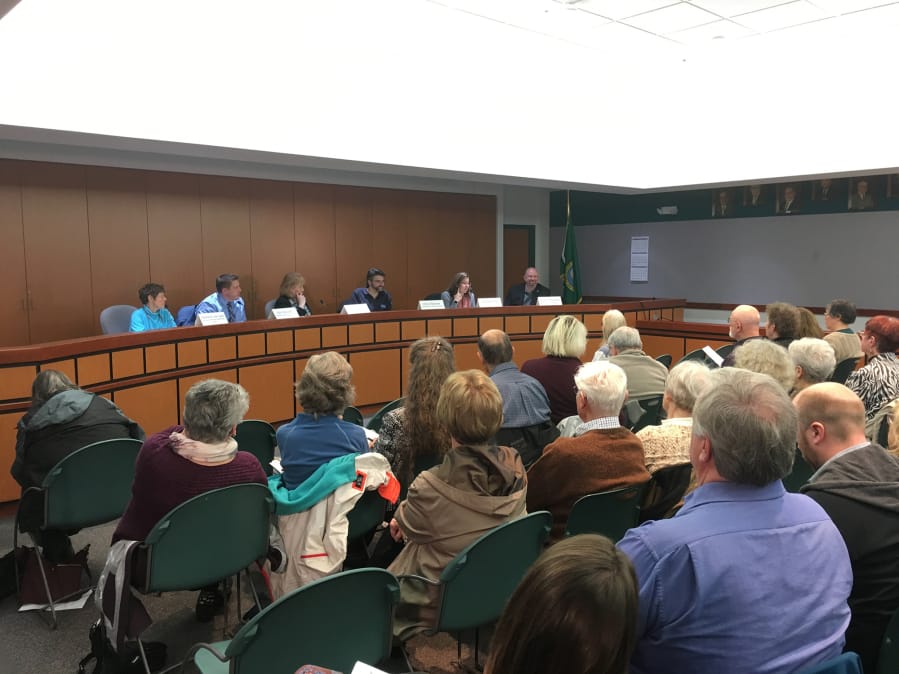HAZEL DELL — Local officials shared their concerns regarding proposed tolling on the Oregon side of Interstate 5, along with thoughts on a host of other topics, as part of a wide-ranging forum on regional transportation issues hosted by the League of Women Voters on Sunday afternoon.
Matt Ransom, the forum moderator and executive director of the state Regional Transportation Council, noted that Washington has built about 20 bridges paid for through tolling in recent history, with a handful of projects still going in the Puget Sound area.
Vancouver Mayor Anne McEnerny-Ogle shared multiple lingering concerns surrounding Oregon’s proposed tolling in the Portland area, specifically the worry that a toll that impacts Washington commuters, who already pay an Oregon income tax, will provide them little benefit.
McEnerny-Ogle, with fellow panelist and Washington State Department of Transportation Regional Administrator Kris Strickler, are two of the three Washington members of Oregon’s Portland Region Value Pricing Advisory Committee, which was put together to research and recommend tolling options on Interstate 5 and Interstate 205 in Oregon.
Most people — and the city council, she said — prefer tolls that go to specific projects or a means to help address traffic problems.
“We want the tolls to address the impacts that will happen in Washington,” she said, noting that it’s unclear what tolling might mean for local bus lines, individual commuters or whatever route turns into the detour.
“But we’ve been getting answers that said money generated in Oregon stays in Oregon, so it can’t come over to disadvantaged communities, to our C-Tran,” she said. “That bothers us, because that distribution of benefits is important to all of us in an equitable way, and we want that to happen.”
McEnerny-Ogle said the city was also concerned about possible impacts any tolling strategy might have on an Interstate 5 Bridge replacement project, and that the city would be lobbying to make sure tolling money contributes to bridge maintenance.
Forum speaker and C-Tran CEO Shawn Donaghy also expressed his doubts.
“The question that I’ve asked on a few occasions is, ‘How will that benefit C-Tran?’ ” he said. “The first answer we got is, ‘It can’t,” and the second answer was, ‘We’ll look into that.’ ”
C-Tran, he joked, is the fourth-largest public transportation system in Oregon.
“It’s hard for me, as a transportation representative, to really swallow the idea that there’s no benefit to public transportation through tolling initiatives that are designed to reduce congestion,” he said.
“I’m having a hard time wrapping my head around it, and I really should be the person saying, ‘Yes, this makes sense to me.’ ”
He said he’d hope any tolling initiatives, locally or regionally, would somehow work in concert with the county’s transit efforts.
Other forum topics ranged from an Interstate 5 Bridge replacement and transportation planning that allows for aging in place to autonomous vehicles and earthquake preparedness.
Forum participants also included Clark County Commission on Aging member Temple Lentz, commuter and league member Chris Strizver, and Vancouver Bicycle/Pedestrian Stakeholder Group member Madeleine von Laue.
League organizers and forum guests encouraged community members to engage with area transportation planning processes through the Regional Transportation Council’s website, rtc.wa.gov.
They also reminded guests that the next Portland Region Value Pricing Advisory Committee open house is planned for 5:30 to 7:30 p.m. April 30 at the Marshall Community Center, 1009 E. McLoughlin Blvd.




